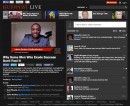What is failure?
Is it the end or the beginning? Why are we so afraid of it? How can we change our relationship to it?
Dictionary Definition
fail·ure [ fáylyər ]
1. lack of success: a lack of success in or at something
2. something less than that required: something that falls short of what is required or expected
3. somebody or something that fails: somebody or something that is unsuccessful
Jullien’s Definition
Failure is the moment we stop investing in something we believe in because of overwhelming and unwelcomed feedback.
We tend to think of failure as the end result of something, but there is actually a moment after a product, project, or person thinks they are finished when they decide that the feedback overwhelms their faith. Therefore, instead of iterating on the seemingly end result, we decide to stop investing entirely in something that only needs minor tweaks.
Perfectionism definitely leads to more failures than anything else. With perfectionist, the feedback is often internal and in their own mind, and the their product or project never makes it into the world at all because they’re seeking an unreal state. Perfection can’t be reached without feedback. Most products, projects, and people fail before anyone else even knows about their existence.
For those that do enter the world, sometimes the feedback is so tough (i.e. users aren’t coming in droves, critics hate it, it’s not selling, etc) that they give up. On any project timeline, the “shipping” of the product to market is only the halfway mark if that. The hardest work comes after the first person interacts with the work. What makes feedback tough is that oftentimes the creator:
1. Feels like they were done and the feedback reveals that they’re only halfway done
2. Feels like the “customer” is taking over their vision for the product/project
3. Feels like they aren’t capable of doing the work
4. Realizes that their listening of what the world wanted was not accurate (at first)
The product/project fails when the person stops at this point. They’ve let the biggest obstacle, the customer/recipient’s voice overbear their inner voice that inspired them to start the product/project in the first place. While getting the product/project started was big, and getting it done and out the door was big, the moment others interact with it is the biggest moment of truth.
[quote] “And the day came when the risk it took to remain tightly closed in a bud was more painful than the risk it took to bloom…”
-Alicia Keys [/quote]
It’s not failure that we fear. It’s fear of going backwards, being behind, losing ground. Ironically, failure rarely leads to any of those. In my life, there have been times where I perceived something as a failure, but someone else saw it in another way and helped me discover how to repurpose it and make it more valuable. (Perceived) failure has only propelled me forward because of how I’ve been able to listen when something doesn’t go as expected. But if we close ourselves off at the moment rich feedback is ready to be given, we miss the opportunity to learn.
Failure is never a dead end. It’s a time for pruning, correction, and redirection. It’s a necessary coach to help you decide how bad you want success. If success came easy, then we would undervalue it—success would become average and then there would be something else we pursue to prove our skills. If we follow failure for long enough in our authentic attempt to achieve success, it will eventually lead us to success. If we adopt an identity as a failure, meaning that failure is our destiny, that’s what where we’ll end up.
I wrote a letter called Dear Failure, that may be helpful for you to read and write for yourself. It changed my relationship to this ephemeral thing we call failure. The letter ends with these words…
Make sure you fail forward!





